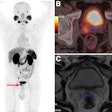
NEW YORK (Reuters Health), Sep 18 - New research challenges the widely held belief that folate protects against colorectal cancer by showing that low circulating levels of this B vitamin, rather than high levels, are actually tied to a reduced risk of the malignancy. This information could factor into the debates now taking place in Europe regarding mandatory folate fortification of foods.
Most studies that have described an anticancer effect of folate have focused on dietary intake, not on circulating levels, lead author Dr. B. Van Guelpen, from Umea University in Sweden, and colleagues note. By contrast, the three prospective studies that have looked at circulating folate levels have yielded conflicting results.
In the present study, reported in the October issue of Gut, the researchers assessed the effect of prediagnostic plasma levels of folate and homocysteine on the risk of colorectal cancer, taking into account genetic variants thought to influence risk. A total of 226 case patients and 437 matched controls were drawn from the population-based Northern Sweden Health and Disease Cohort.
In the overall analysis, a bell-shaped curve between folate levels and colorectal cancer risk was observed. Subjects in the middle quintile for folate levels were twice as likely to develop colorectal cancer as those in the lowest quintile.
By contrast, when the analysis was confined to subjects who were followed longer than a median of 4.2 years, a direct relationship between folate levels and cancer risk was seen. In this analysis, subjects in the highest folate quintile were 3.87-times more likely to develop colorectal cancer than those in the lowest quintile (p = 0.007).
Homocysteine levels were not associated with colorectal cancer risk, the authors note.
A 677 TT genotype at the MTHFR gene was associated with a 59% decreased risk of colorectal cancer compared with the 677 CC genotype. Conversely, a 1298 CC genotype raised the risk of cancer by 62% relative to a 1298 AA genotype. There was evidence, however, that the elevated risk with the 1298 CC genotype was largely related to a decreased likelihood of also having the beneficial 677C>T variant.
As to why the current findings seem to contradict previous research, the authors suggest that it may relate to the inadequate folate status of the population being studied. The present cohort may represent the "lower end of the biological folate spectrum," they add.
The authors conclude that the present findings do not necessarily negate a beneficial effect for high folate levels, but do indicate such an effect for low levels.
"Mandatory folic acid fortification is probably the most important...intervention in nutrition and public health in decades," Dr. Y-I Kim, from the University of Toronto, comments in a related editorial. "Some proponents of mandatory folic acid fortification have labeled the delay in ... fortification in European countries as public health malpractice."
However, findings such as those from the present study give pause to the drive for folate fortification, Dr. Kim notes. "Long term follow-up studies are urgently warranted to determine the effect of folic acid fortification and supplementation on the incidence of cancer and other potential adverse effects."
Last Updated: 2006-09-18 11:01:21 -0400 (Reuters Health)
Gut 2006;55:1387-1389,1461-1466.
Related Reading
Folate, vitamin B6 normalize endothelial function in diabetic children, July 11, 2006
Copyright © 2006 Reuters Limited. All rights reserved. Republication or redistribution of Reuters content, including by framing or similar means, is expressly prohibited without the prior written consent of Reuters. Reuters shall not be liable for any errors or delays in the content, or for any actions taken in reliance thereon. Reuters and the Reuters sphere logo are registered trademarks and trademarks of the Reuters group of companies around the world.
















